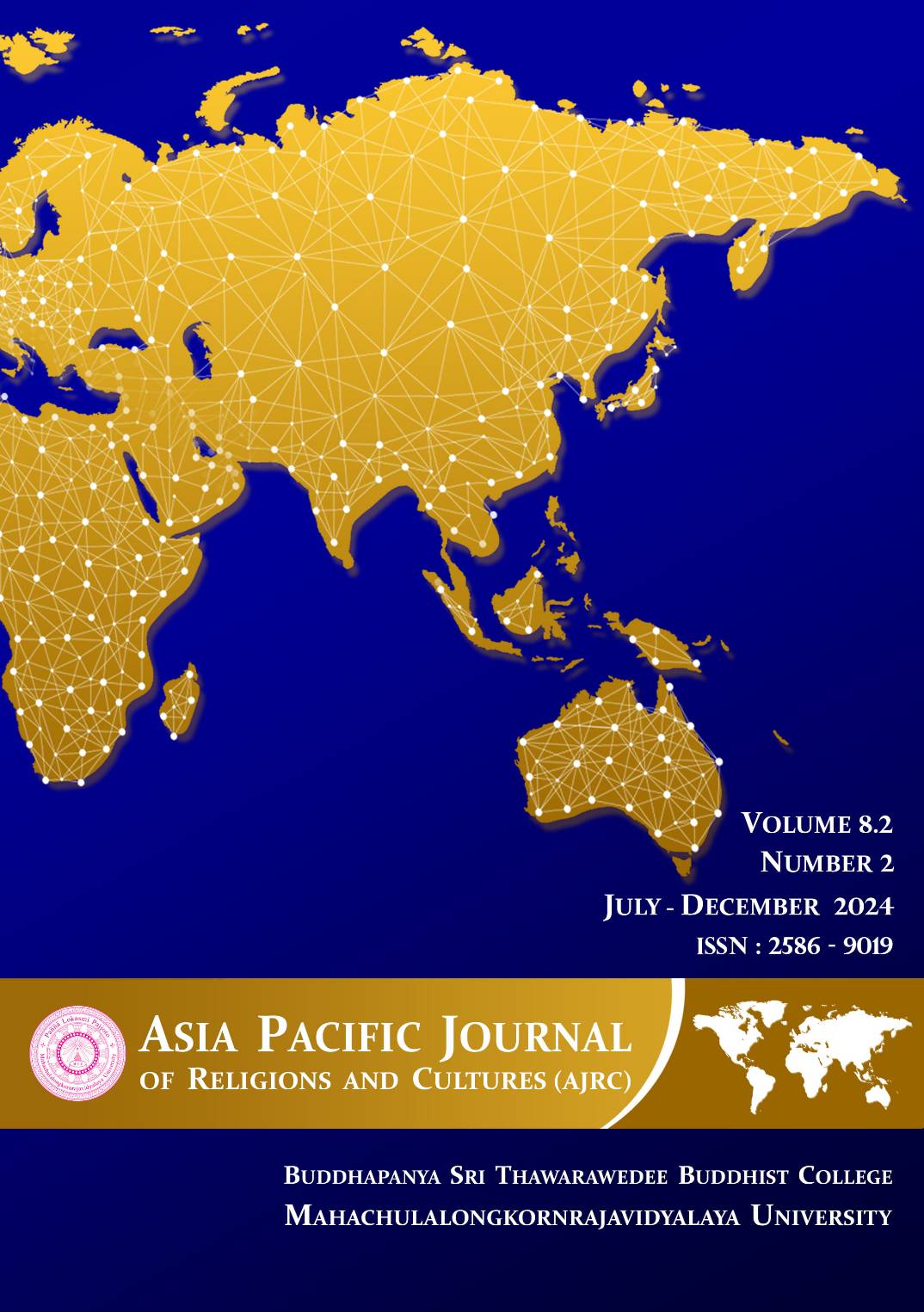USING A TASK-BASED APPROACH AND AUTHENTIC MATERIALS TO ENHANCE FLUENTLY ENGLISH PROFICIENCY OF THAI HIGH SCHOOL STUDENTS STUDYING ENGLISH AS A SECOND FOREIGN LANGUAGE IN MARIE UPATHAM SCHOOL, NAKHONPATHOM, THAILAND
Main Article Content
Abstract
The objectives of this study were to compare the mean scores of students' English proficiency tests before and after receiving instruction using the task-based approach and authentic materials, and to study students' attitudes toward the instructional method. This study employed a pre-experimental design (one-group pretest-posttest). The sample comprised 50 eleventh-grade students from Marie Upatham School during the first semester of the 2024 academic year, selected through purposive sampling. The instruments used for this study were: 1) the 24 periods of lesson plans using the task-based approach and authentic materials, 2) the pre-post English proficiency tests, and 3) the questionnaire on students' attitudes toward the task-based approach and authentic materials. The data were analyzed by paired sample t-test, mean, and standard deviation. The results revealed that the mean score of students' English proficiency tests after learning with the task-based approach and authentic materials was higher than before at the 0.05 level of significance, and the students’ attitudes toward the task-based approach and authentic materials were highly positive. This study provided insights into improving English proficiency through the task-based approach and authentic materials, offering innovative perspectives for educators and researchers to optimize pedagogical practices and educational outcomes.
Article Details

This work is licensed under a Creative Commons Attribution-NonCommercial-NoDerivatives 4.0 International License.
References
Arbaoui, F. Z. E. (2023). Improving business students’ speaking skill through task-based instruction in Moroccan EFL classroom. European Journal of Education Studies, 10(8), 291-310. https://doi.org/10.46827/ejes.v10i8.4928
Azizi, Z., Rezai, A., Namaziandost, E., & Tilwani, S. A. (2022). The role of computer self-efficacy in high school students’ e-learning anxiety: A mixed-methods study. Contemporary Educational Technology, 14(2), 1–14. https://doi.org/10.30935/cedtech/11570.
Baker, C. (1992). Attitudes and Language. Multilingual Matters.
Berardo, S. A. (2006). The use of authentic materials in the teaching of reading. The Reading Matrix, 6(2), 60-69.
Cohen, L., Manion, L. and Morrison, K. (2018). Research methods in education. 8th ed. The UK: Routledge.
Cronbach, L. J. (1990). Essentials of psychology testing. 5th ed. New York: Harper Collins Publishers Inc.
Dickinson, P. (2010). Implementing task-based language teaching in a Japanese EFL context. Centre for English Language Studies Postgraduate Programmes. The University of Birmingham, UK.
Ellis, R., Skehan, P., Li, S., Shintani, N. & Lambert, C. (2020). Task-based language teaching: Theory and practice. Cambridge University Press.
Gall, M. D., Borg, W. R., & Gall, J. P. (1996). Research Methods. In W. R. Borg & D. M. Gall (Eds.), Educational Research: An Introduction (pp. 165–370). New York: Longman.
Ganta, T. G. (2015). The strengths and weaknesses of task-based learning (TBL). Scholarly Research Journal for Interdisciplinary Studies, 3(16), 2760- 2771.
Gilmore, A. (2007). Authentic materials and authenticity in foreign language learning. Language Teaching, 40, 97-118. doi:10.1017/S0261444807004144.
Harper, J., & Widodo, H. P. (2020). Perceptual mismatches in the interpretation of task-based ELT materials: A micro-evaluation of a task-based English lesson. Innovation in Language Learning and Teaching, 14(2), 114-132. https://doi.org/10.1080/17501229.2018.1502773.
Heryatun, Y., Sulhah, S., & Fitriana, R. (2023). Need analysis of authentic materials on English language teaching (A study at the second grade of MA. Daarul Ulum Cihara-Lebak). Jurnal Scientia, 12(1), 112-117.
Kusumawardani, R., Santosa, R., & Roschsantiningsih, D. (2018). Explore the use of authentic materials to teach reading for junior high school. International Journal of Multicultural and Multireligious Understanding, 5(4), 298-307.
Nghi, T. T. (2023). Exploring the effectiveness of authentic materials and task-based learning approaches in enhancing English language skills and motivation of Vietnamese EFL learners: A quasi-experimental study. AIJR Publisher. https://doi.org/10.21467/proceedings.150.1.
Prabhu, N. S. (1987). Second Language Pedagogy. Oxford: Oxford University Press.
Romero-Molina, P. X., & Alfonso-Vargas, J. (2023). Authentic materials and task design: A teaching amalgam for listening. Colombian Applied Linguistics Journal, 25(1), 118-131. https://doi.org/10.14483/22487085.18581.
Sertpunya, S. (2015). Development of English Lessons for Improving Listening and Speaking Skills of Hotel Service Personnel through Task-based Learning activities Case Study JW Marriott Hotel Bangkok. North Bangkok University.
Stroud, R. (2013). Task-based learning challenges in high schools: What makes students accept or reject tasks? The Language Teacher, 37(2), 21-28.
Tachom, K. (2021). Enhancing Thai EFL students' EFL vocabulary knowledge through the use of task-based language teaching and storytelling technique adopting Thai folktales. Asian Journal of Education and Training, 7(4), 235-243. https://doi.org/10.20448/journal.522.2021.74.235.243
Tsunemoto, A., & McDonough, K. (2021). Exploring Japanese EFL learners’ attitudes toward English pronunciation and its relationship to perceived accentedness. Language and Speech, 64(1), 24–34. https://doi.org/10.1177/0023830919900372.
Tuckman, B. W. (1999). Conducting educational research 5th ed. Sthed U.S.A.: Hercourt Brace & Company.
Willis, J. (1996). A framework for task-based language teaching. New York: Longman.
Wu, X., Liao, L., & DeBacker, T. K. (2016). Implementing Task-Based Instruction in ESP Class: An Empirical Study in Marine Engineering English. Journal of Language Teaching and Research, 7(5), 936-945. https://dx.doi.org/10.17507/jltr.0705.14


